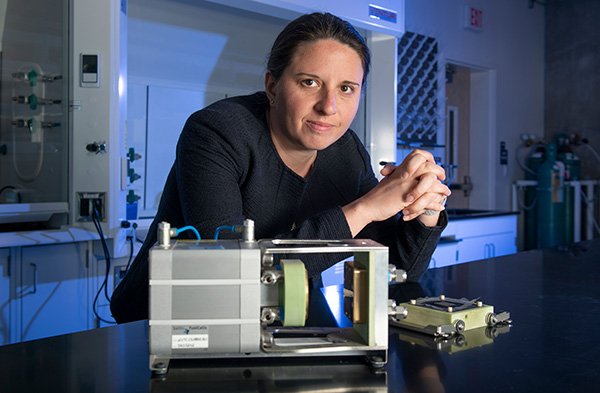Enabling Hydrogen to Power Trucks

Aug. 21, 2023 - As California moves toward having new cars and light trucks be zero-emission vehicles by 2035, it still needs a solution for heavy-duty vehicles (HDVs) like trucks and buses. That’s because HDVs produce about 26% of the transportation sector’s CO2 emissions even though they make up only 7% of the vehicles on the road.
While most of the auto industry is turning to electric vehicles, HDVs need a lighter and more durable solution than batteries due to their heavy loads and the roughly one million miles trucks travel in a lifetime.
Iryna Zenyuk, director of the National Fuel Cell Research Center and associate professor of chemical and biomolecular engineering at UCI, believes hydrogen is the answer. Zenyuk says hydrogen can provide HDVs fuel that is light, long-lasting and quick to refill.

Her team is working with Bosch to design hydrogen fuel cells for HDVs. To that end, Zenyuk and UCI doctoral student Kaustubh Khedekar recently published a paper in the journal Nature Catalysis to show how to slow the degradation of platinum in fuel cells.
Platinum is used as a catalyst in fuel cells. The research team showed how platinum degrades and agglomerates at the end of life by simulating truck driving through accelerated stress tests.
"Using a new methodology, our study captures crucial platinum degradation events at a scale relevant to real-world applications,” said Khedekar, who is now a postdoctoral fellow at Los Alamos National Laboratory. “Thus, the results provide solutions that can immediately reduce platinum wastage in emission-free heavy-duty fuel cell vehicles, decreasing their initial cost and accelerating their commercialization."
They recommend designing catalyst layers to have a homogenous distribution of platinum at the beginning of life. This uniform dispersal is critical to enable the metal to not degrade as much during operation. “Our research on in-plane platinum movement brings us one step forward to developing fuel cells for trucks,” Zenyuk said.
UCI’s National Fuel Cell Research Center is a global leader in developing and deploying fuel cell technology and systems.
The research for the paper was conducted in collaboration with Colorado School of Mines, University of Palermo, Berkeley Lab and Bosch.
- Natalie Tso
